Communications Library
Books/Journals
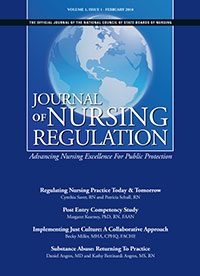
Journal of Nursing Regulation
The Journal of Nursing Regulation (JNR) is a peer-reviewed, academic/professional journal published quarterly in January, April, July and October. It provides a worldwide forum for sharing research, evidence-based practice, and innovative strategies and solutions related to nursing regulation and practice.
The Journal of Nursing Regulation is available online. Questions or comments may be directed to jnr@ncsbn.org.
2022 | Books/Journals
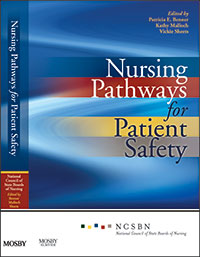
Nursing Pathways for Patient Safety
With a wealth of helpful guidelines and assessment tools, Nursing Pathways for Patient Safety makes it easy to identify the causes of practice breakdowns and to reduce health care errors.
2010 | Books/Journals
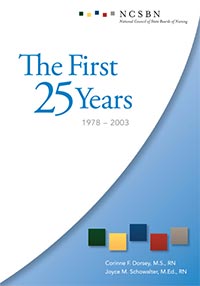
The First 25 Years: 1978-2003
This book explores the NCSBN organization's origins and its work from 1978-2003, as well as the historical role of nursing regulation.
2009 | Books/Journals
Brochures and Posters
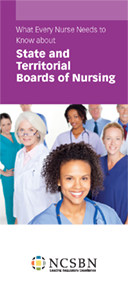
State and Territorial Boards of Nursing: What Every Nurse Needs to Know
This brochure offers nurses an explanation of what boards of nursing (BONs) do for the profession and those who work in it. This brochure provides information regarding:
- A BON's investigation into violations of a state's nurse practice act (NPA)
- The process for filing a complaint against a nurse who has exhibited unsafe, negligent or incompetent behavior
- What a nurse can expect while their complaint is being investigated
2018 | Brochures/Posters
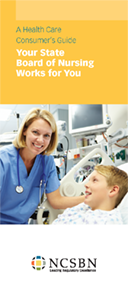
Your State Board of Nursing Works for You: A Health Care Consumer's Guide
This brochure explains how a board of nursing protects the public and
- Serves as a guide for consumers who have experienced or witnessed a nurse exhibiting unsafe, negligent or incompetent behavior
- Explains what consumers can expect when a complaint is being investigated
- Defines various nursing roles and responsibilities
2018 | Brochures/Posters
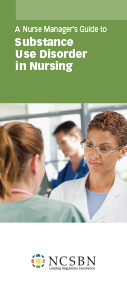
A Nurse Manager’s Guide to Substance Use Disorder in Nursing
Substance use disorder (SUD) is rarely discussed on nursing units. It is the responsibility of a nurse manager, however, to provide education, dispel myths and take action when needed. This brochure outlines the roles and responsibilities of the nurse manager in situations involving SUD.
2018 | Brochures/Posters
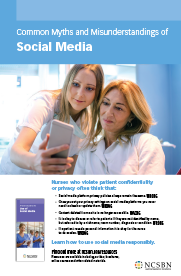
Poster: Common Myths and Misunderstandings of Social Media
This poster is designed to help both new and experienced nurses understand how social media can be properly used in the profession without breaking patient privacy and confidentiality laws. This is a companion piece to A Nurse's Guide to the Use of Social Media.
2018 | Brochures/Posters
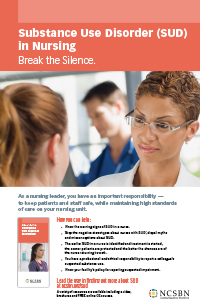
Poster: Substance Use Disorder (SUD) in Nursing: Break the Silence.
This poster is designed to bring awareness about SUD to nursing leaders, as they have an important responsibility — to keep patients and staff safe, while maintaining high standards of care on your nursing unit. This is a companion piece to the brochure A Nurse Manager’s Guide to Substance Use Disorder in Nursing.
2018 | Brochures/Posters
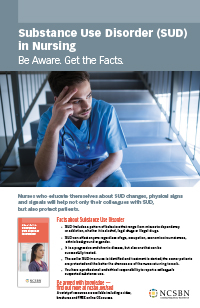
Poster: Substance Use Disorder (SUD) in Nursing: Be Aware. Get the Facts.
This poster is designed to help nurses educate themselves about SUD changes, physical signs and signals will help not only their colleagues with SUD, but also protect patients. This is a companion piece to What You Need to Know About Substance Use Disorder in Nursing.
2018 | Brochures/Posters
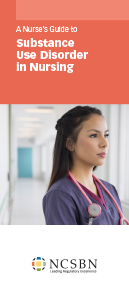
What You Need to Know About Substance Use Disorder in Nursing
This brochure explains how substance use disorder (SUD) affects the nursing profession. Nurses have a legal ethical responsibility to report a colleague’s suspected drug use; learn how to recognize the warning signs and what to do to get a colleague help. Nurses that educate themselves about SUD help not only their colleagues, but they also protect patients.
2018 | Brochures/Posters
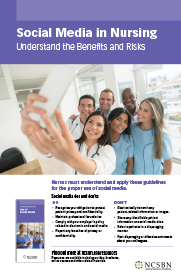
Poster: Social Media in Nursing: Understand the Benefits and the Risks
This poster is designed to help both new and experienced nurses understand how social media can be properly used in the profession without breaking patient privacy and confidentiality laws. This is a companion piece to A Nurse's Guide to the Use of Social Media.
2018 | Brochures/Posters
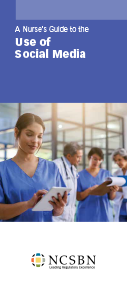
A Nurse's Guide to the Use of Social Media
This brochure is designed to help both new and experienced nurses understand how social media can be properly used in the profession without breaking patient privacy and confidentiality laws. It outlines:
- Potential consequences for violating patient confidentiality by using various scenarios and situations
- Uncovers common myths and misunderstandings about social media
- Provides tips for how nurses can use social media appropriately while avoiding disclosing confidential patient information
2018 | Brochures/Posters
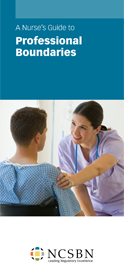
A Nurse's Guide to Professional Boundaries
This brochure helps nursing students, educators, health care organizations and the public understand and apply the concepts of professional boundaries between a nurse and a client.
2018 | Brochures/Posters
Publications
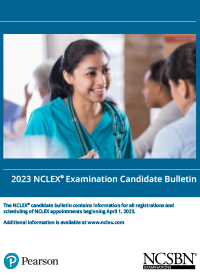
2023 NCLEX Candidate Bulletin
This resource serves as your guide from before to after the NCLEX, including important contact information, details on how to register, the NCLEX Candidate Rules and results processing.
2023 | Publications
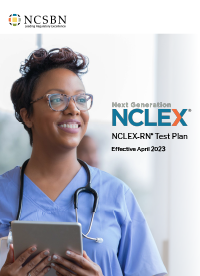
2023 NCLEX-RN Test Plan
The NCLEX-RN test plan includes an in-depth overview of the content categories along with new details about administration of the exam as well as clinical judgment.
*Dans cette publication, le masculin est employé sans préjudice afin d’alléger le texte.
2022 | Publications
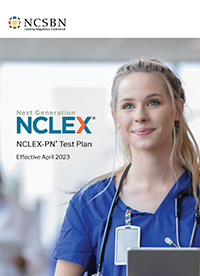
2023 NCLEX-PN Test Plan
The NCLEX-PN test plan includes an in-depth overview of the content categories along with new details about administration of the exam as well as clinical judgment.
2022 | Publications
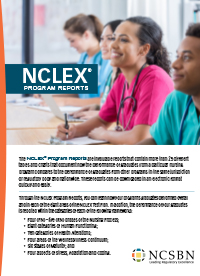
NCLEX Program Reports - Subscription Overview
Join hundreds of educators across the country who subscribe to NCLEX Program Reports. These reports are the only source for detailed information about your graduates' performance on the NCLEX examinations.
2022 | Publications
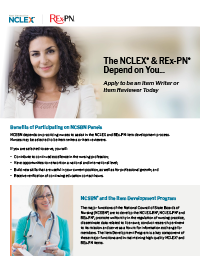
Item Development Flyer - The NCLEX and REx-PN Depend On You!
NCSBN depends on nurses to assist in the NCLEX and REx-PN item development process.
2022 | Publications
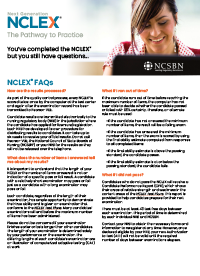
You've Completed the NCLEX - But You Still Have Questions
This flyer is for candidates who have just completed the NCLEX. Here, candidates can find information on how their results are processed, what happens if they don’t pass the exam, the NCLEX Quick Results Service, and who they can contact if they have a problem with the NCLEX or its administration.
2021 | Publications
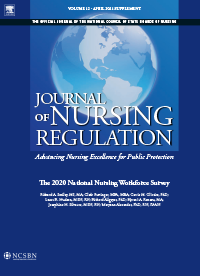
2021 Environmental Scan
The 2021 NCSBN Environmental Scan represents a systematic and continuous effort to search for information about how nursing is evolving, and what that means for the future of nursing regulation. A variety of sources have been used to compile this document. Of course, this publication represents a mere snapshot in time of the world around us - both inside and outside of nursing regulation. It was distributed as a supplement to the Journal of Nursing Regulation in January 2021.
2021 | Publications
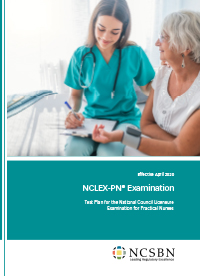
2020 NCLEX-PN Test Plan
The NCLEX-PN examination test plan includes an in-depth overview of the content categories along with details about the administration of the exam as well as NCLEX-style item writing exercises and case scenario examples.
2020 | Publications
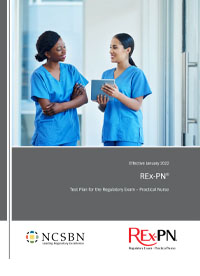
2022 REx-PN Test Plan
The REx-PN test plan includes an in-depth overview of the content categories, details about the administration of the exam and REx-PN style item writing exercises.
2020 | Publications
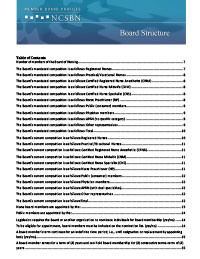
Member Board Profiles
An online publication that provides an overview of the regulatory environment in which the 59 nursing regulatory bodies function. Visit the National Nursing Database to download various reports. Updated annually.
2020 | Publications
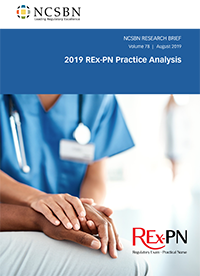
REx-PN Practice Analysis
The periodic performance of practice analysis (i.e., job analysis) studies assists BCCNM and CNO in evaluating the validity of the test plan that guides content distribution of the licensure examination for Licensed Practical/Registered Practical Nurses (LPN/RPNs). Because the Canadian health care industry is rapidly changing, practice analysis studies will be conducted by BCCNM and CNO on a five-year cycle. This practice analysis was conducted with the assistance of National Council of State Boards of Nursing (NCSBN).
2019 | Publications
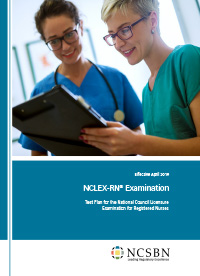
2019 NCLEX-RN Test Plan
The NCLEX-RN examination test plan includes an in-depth overview of the content categories along with details about the administration of the exam as well as NCLEX-style item writing exercises and case scenario examples.
*Dans cette publication, le masculin est employé sans préjudice afin d’alléger le texte.
2019 | Publications
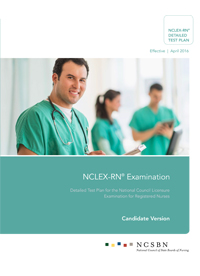
2016 NCLEX-RN Detailed Test Plan - Candidate Version
The candidate version of the NCLEX-RN examination test plan includes an in-depth overview of the content categories along with details about the administration of the exam.
*Dans cette publication, le masculin est employé sans préjudice afin d’alléger le texte.
2016 | Publications
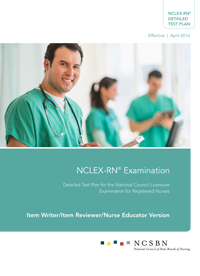
2016 NCLEX-RN Detailed Test Plan - Educator Version
The educator version of the 2016 NCLEX-RN Test Plan includes an in-depth overview of the content categories along with details about the administration of the exam.
2016 | Publications
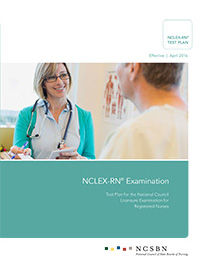
2016 NCLEX-RN Basic Test Plan
The basic NCLEX-RN test plan includes an overview of the content categories along with details about the administration of the exam.
2015 | Publications
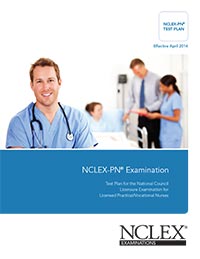
2014 NCLEX-PN Test Plan - Basic
The NCLEX examination test plan provides a concise summary of the content and scope of the examination. The test plan also serves as a guide for both examination development and candidate preparation.
The 2014 NCLEX-PN Test Plan is effective April 1, 2014.
2014 | Publications
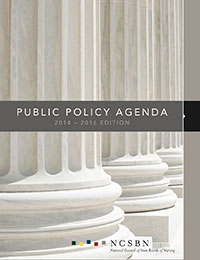
Public Policy Agenda
The NCSBN Public Policy Agenda delineates the organization's policy goals, highlights the organization's policy activities and outlines what you need to know about NCSBN.
2014 | Publications
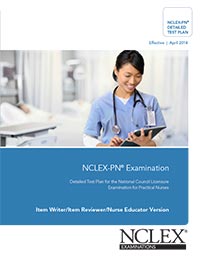
2014 NCLEX-PN Detailed Test Plan - Educator Version
The NCLEX examination test plan provides a concise summary of the content and scope of the examination. The test plan also serves as a guide for both examination development and candidate preparation.
2014 | Publications
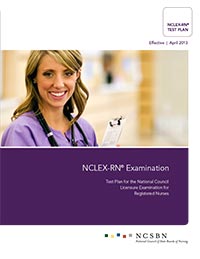
2013 NCLEX-RN Test Plan - Basic
The NCLEX examination test plan provides a concise summary of the content and scope of the examination. The test plan also serves as a guide for both examination development and candidate preparation.
The 2013 NCLEX-RN Test Plan is effective April 1, 2013.
*Dans cette publication, le masculin est employé sans préjudice afin d’alléger le texte.
2013 | Publications
Papers
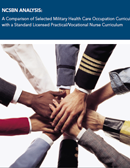
Military Analysis
This document presents a comprehensive standard curriculum that is representative of the minimum didactic and clinical requirements necessary for practical/vocational nursing education in the U.S. Some nursing regulatory bodies might have additional requirements in order to take the NCLEX and be licensed in their jurisdiction.
2024 | Papers
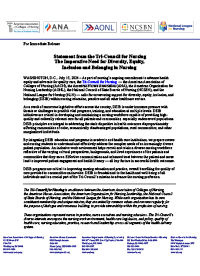
Statement from the Tri-Council for Nursing: The Imperative Need for Diversity, Equity, Inclusion and Belonging in Nursing
As part of nursing’s ongoing commitment to advance health equity and advocate for quality care, the Tri-Council for Nursing — the American Association of Colleges of Nursing (AACN), the American Nurses Association (ANA), the American Organization for Nursing Leadership (AONL), the National Council of State Boards of Nursing (NCSBN), and the National League for Nursing (NLN) — calls for unwavering support for diversity, equity, inclusion, and belonging (DEIB) within nursing education, practice and all other health care sectors.
2024 | Papers
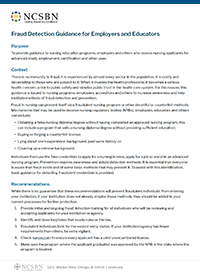
Fraud Detection Guidance for Employers and Educators
This paper provides nurse educators and employers with recommendations for identifying fraud.2024 | Papers

Policy Brief: Clinical Experiences for Unvaccinated Nursing Students
To provide guidance to boards of nursing and nursing education programs that are receiving requests from students for alternate clinical experiences when the program’s clinical sites require the COVID-19 vaccine.
2021 | Papers

Policy Brief Dissemination of COVID Information
To address the misinformation being disseminated about COVID-19 by nurses.For the purposes of this statement, misinformation is defined as distorted facts, inaccurate or misleading information not grounded in the peer-reviewed scientific literature and counter to information being disseminated by the Centers for Disease Control and Prevention (CDC) and the Food and Drug Administration (FDA).
2021 | Papers
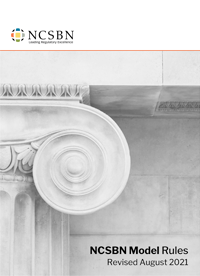
NCSBN Model Rules
The Model Act & Rules provides an evidence-based framework of nursing statutes and regulations for nursing regulatory bodies to utilize during policy and advocacy discussions. The current Model Act & Rules were updated by a NCSBN committee under a charge to perform ongoing review, revision, and development of Model Act & Rules to reflect the current regulatory environment and to remove any other language that does not support public safety. This work began in 2018 and was approved by the Delegate Assembly in 2021.
2021 | Papers
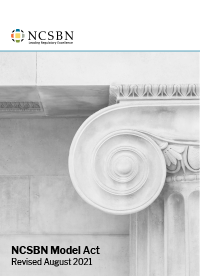
NCSBN Model Act
The Model Act & Rules provides an evidence-based framework of nursing statutes and regulations for nursing regulatory bodies to utilize during policy and advocacy discussions. The current Model Act & Rules were updated by a NCSBN committee under a charge to perform ongoing review, revision, and development of Model Act & Rules to reflect the current regulatory environment and to remove any other language that does not support public safety. This work began in 2018 and was approved by the Delegate Assembly in 2021.
2021 | Papers

Policy Brief: U.S. Nursing Leadership Supports Practice/Academic Partnerships to Assist the Nursing Workforce during the COVID-19 Crisis
This opportunity will not only provide much needed clinical education to assist in meeting program requirements, it is an unparalleled opportunity for nursing students to assist the nation in a time of crisis and learn the principles of population health and emergency management. This academic-practice model demonstrates that in the midst of a periling disruption in the environment, such as COVID-19, continuous innovation can occur
2021 | Papers
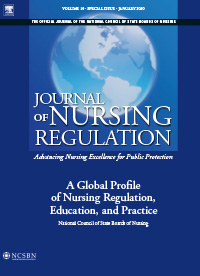
A Global Profile of Nursing Regulation, Education, and Practice
The Global Profile of Nursing Regulation, Education, and Practice is an in-depth analysis of the nursing regulation data collected in NCSBN’s Global Regulatory Atlas. Information on nursing governance, licensure and registration, education, discipline, and practice has been compiled from 320 jurisdictions representing more than 21 million nurses worldwide. This profile presents an analysis of these data at both a global and regional level.
2020 | Papers
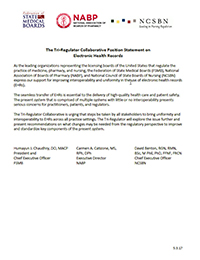
The Tri-Regulator Collaborative Position Statement on Electronic Health Records
The Tri-Regulator Collaborative is urging that steps be taken by all stakeholders to bring uniformity and interoperability to EHRs across all practice settings.
2017 | Papers
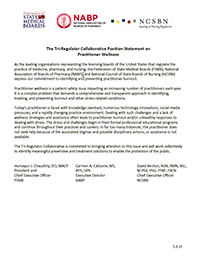
The Tri-Regulator Collaborative Position Statement on Practitioner Wellness
Practitioner wellness is a patient safety issue impacting an increasing number of practitioners each year. It is a complex problem that demands a comprehensive and transparent approach in identifying, treating, and preventing burnout and other stress-related conditions.
2017 | Papers

Preceptor support in hospital transition to practice programs
Preceptor support in hospital transition to practice (TTP) programs.
2015 | Papers
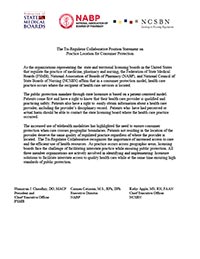
The Tri-Regulator Collaborative Position Statement on Practice Location for Consumer Protection
The Tri-Regulator Collaborative affirms that in a consumer protection model, health care practice occurs where the recipient of health care services is located.
2014 | Papers
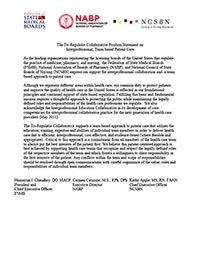
The Tri-Regulator Collaborative Position Statement on Interprofessional, Team-based Patient Care
Tri-Regulator Collaborative express its support for interprofessional collaboration and a team-based approach to patient care.
2014 | Papers
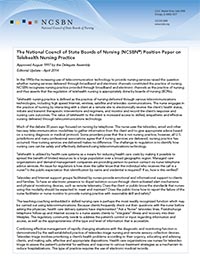
The NCSBN Position Paper on Telehealth Nursing Practice
In the 1990s the increasing use of telecommunication technology to provide nursing services raised the question whether nursing services delivered through broadband and electronic channels constituted the practice of nursing. NCSBN recognizes nursing practice provided through broadband and electronic channels as the practice of nursing and thus asserts that the regulation of telehealth nursing is appropriately done by boards of nursing.
2014 | Papers
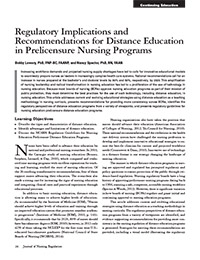
Regulatory Implications and Recommendations for Distance Education in Prelicensure Nursing Programs
Regulatory Implications and Recommendations for Distance Education in Prelicensure Nursing Programs." Description: This article provides the background and related literature findings for the recommendations that NCSBN's Distance Learning Education Committee made for prelicensure nursing programs. These recommendations were adopted at NCSBN's 2014 annual meeting. Further, regulator and educator issues are explored. Five regulatory guidelines are explained, and a timeline for BONs meeting these recommendations is described. Citation: Lower, B. & Spector, N. (2014). Regulatory implications and recommendations for distance education in prelicensure nursing programs. Journal of Nursing Regulation, 5(3), 24-33.
2014 | Papers
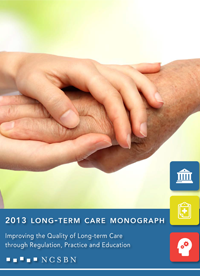
Long-term Care Conference Monograph
The Long-term Care Conference monograph includes themes from the discussions, along with brief summaries of published research on each of the major themes. A post-conference survey was sent to all participants six months following the conference to identify any steps taken or changes made as a result of attending the conference. The results of the survey are also presented. The monograph is intended for conference participants, nurses practicing in LTC, nursing home leadership, and organizations/agencies representing nursing homes and nursing home leadership.
2014 | Papers
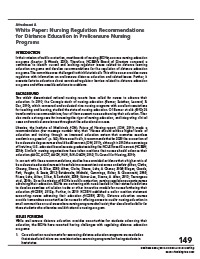
White Paper: Nursing Regulation Recommendations for Distance Education
Background and literature review on the regulation of prelicensure distance education programs; regulatory issues; recommendations for BONs; visual model and timeline for adopting the recommendations.
2014 | Papers
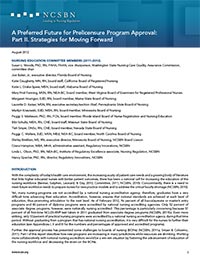
2012 Prelicensure Nursing Program Approval
This is Part II of the Nursing Education Committee document, which contains strategies for moving forward on the future of approval of BONs. As part of this work, the committee members hosted a World Cafe' meeting, where the participants dialogued about the alignment of approval, education and accreditation. See the monograph that resulted from that World Cafe' meeting.
2012 | Papers
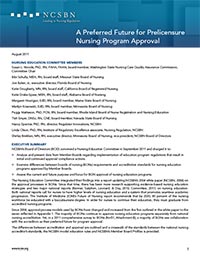
A Preferred Future for Prelicensure Nursing Program Approval
NCSBN's Nursing Education Committee wrote a report on the first year of their work in analyzing and making recommendations for the future of approval by Boards of Nursing. This report was approved in May 2011, by NCSBN's Board of Directors.
2011 | Papers
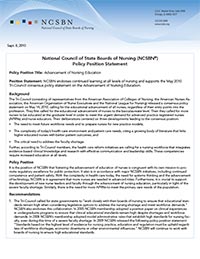
2010 Policy Position Statement
Position statement on the advancement of Nursing Education. NCSBN's Board of Directors endorses continued learning at all levels of nursing and supports the Tri-Council consensus policy on the advancement of Nursing Education.
2010 | Papers
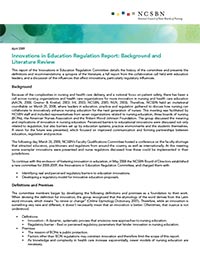
Innovations in Education Regulation Report
This report of the Innovations in Education Regulation Committee details the history of the committee and presents the definitions and recommendations; a synopsis of the literature; a full report from the collaborative call held with education leaders; and a discussion of the influences that affect innovations, particularly regulatory influences.
2009 | Papers
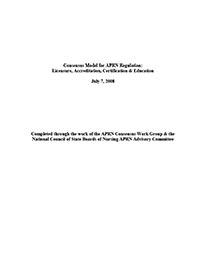
Consensus Model for APRN Regulation: Licensure, Accreditation, Certification and Education
Gain a better understanding of the requirements for adopting the Consensus Model for APRN Regulation.
2008 | Papers
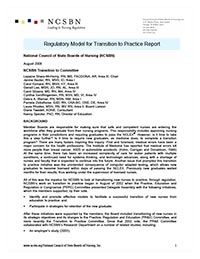
Transition to Practice Report
This report is a companion to the Transition Evidence Grid. The report synthesizes all the evidence on transitioning new nurses to practice. It illustrates the importance of formal transition programs in protecting the public, and it provides the data that support the components of the Transition Regulatory Model. This report was adopted by the May, 2008 NCSBN Board of Directors.
2008 | Papers
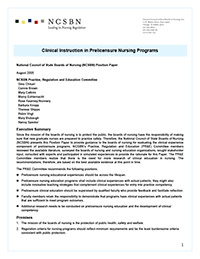
Clinical Instruction in Prelicensure Nursing Programs
NCSBN's membership takes the position that all prelicensure students should have supervised, clinical experiences with actual patients, at the level of licensure to which they are seeking. This paper provides the background and evidence for that decision.
2005 | Papers
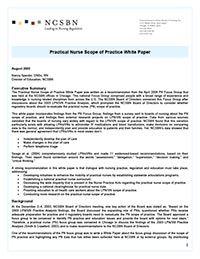
Practical Nurse Scope of Practice White Paper
This paper was written after NCSBN brought in a focus group of LPN/VN experts from around the country. The paper reviews the rich discussion that took place at the focus group, presents internal and external research findings of the PN scope of practice, and reviews surveys that were sent to boards of nursing and external PN groups. The paper makes six recommendations. Adopted August, 2005.
2005 | Papers
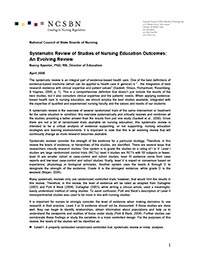
Systematic Review of Studies on Nursing Education Outcomes: An Evolving Review
This paper critically reviews the available research on methodologies used to educate nurses, particularly looking at those studies that identify outcomes. Specified criteria were used for selecting the studies, and each study was reviewed with regard to: sample, comparison studied, procedures, key results, strengths and weaknesses, and implications for boards of nursing. Adopted August, 2005.
2005 | Papers
Research Briefs
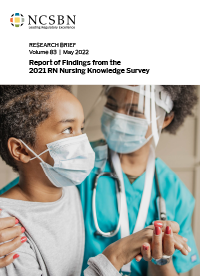
Report of Findings from the 2021 RN Nursing Knowledge Survey
This study identifies the knowledge needed by newly licensed RNs. The results of this study will be used to inform item development. Because changes can occur in registered nurse (RN) practice, this study is conducted on a three-year cycle. Due to COVID-19, the RN knowledge survey was conducted in 2021.
2022 | Exams Research
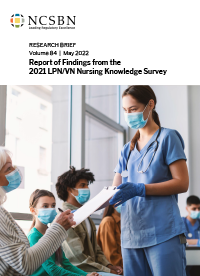
Report of Findings from the 2021 LPN/VN Nursing Knowledge Survey
This study identifies the knowledge needed by newly licensed practical/vocational nurses (LPN/VNs). The results of this study (i.e., the important knowledge statements) will be used to inform item development. Because changes can occur in LPN/VN practice, this study is conducted on a three-year cycle.
2022 | Exams Research
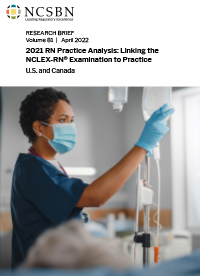
2021 RN Practice Analysis: Linking the NCLEX-RN Examination to Practice
in evaluating the validity of the NCLEX-RN test plan that guides content distribution of the licensure examination. This publication analyzes the U.S. and Canadian entry-level nursing testing populations, including the relevance of clinical judgment in the performance of nursing activities. Because changes can occur in registered nurse (RN) practice, practice analyses are conducted on a three-year cycle. Due to COVID-19, the RN practice analysis was conducted in 2021.
2022 | Exams Research
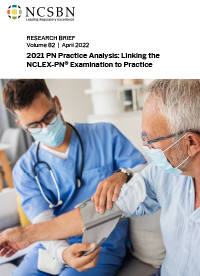
2021 PN Practice Analysis: Linking the NCLEX-PN Examination to Practice
This periodic performance of practice analysis (i.e., job analysis) study assists NCSBN in evaluating the validity of the NCLEX-PN test plan that guides content distribution of the licensure examination. This publication analyzes the U.S. population of entry-level licensed practical/vocational (LPN/VN) nurse practice, including the relevance of clinical judgment in the performance of nursing activities. Because changes can occur in LPN/VN practice, practice analyses are conducted on a three-year cycle.
2022 | Exams Research
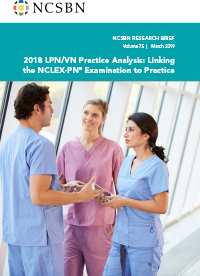
2018 LPN/VN Practice Analysis: Linking the NCLEX-PN Examination to Practice (Vol. 75)
This periodic performance of practice analyses (i.e., job analysis) studies assists NCSBN in evaluating the validity of the test plan that guides content distribution of the licensure examination. Because changes can occur in licensed practical/vocational nurse (LPN/VN) practice, practice analyses are conducted on a three-year cycle.
2019 | Exams Research
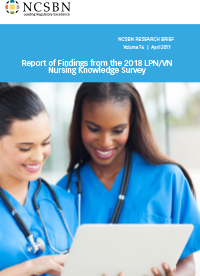
Report of Findings from the 2018 LPN/VN Nursing Knowledge Survey (Vol. 76)
This study identifies the knowledge needed by newly licensed practical/vocational nurses (LPN/VNs). The results of this study (i.e., the important knowledge statements) will be used to inform item development.
2019 | Exams Research
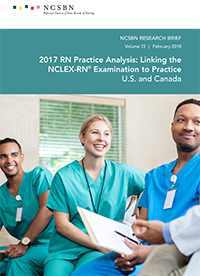
2017 RN Practice Analysis: Linking the NCLEX-RN Examination to Practice - US & Canada (Vol. 72)
This periodic performance of practice analyses (i.e., job analysis) studies assists NCSBN in evaluating the validity of the NCLEX-RN test plan that guides content distribution of the licensure examination. Because changes can occur in registered nurse (RN) practice, practice analyses are conducted on a three-year cycle. This publication analyzes the U.S. & Canadian nurse testing populations.
2018 | Exams Research
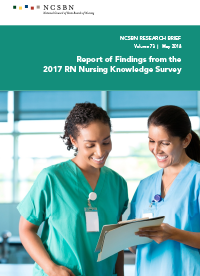
Report of Findings from the 2017 RN Nursing Knowledge Survey
This study identifies the knowledge needed by newly licensed RNs. The results of this study will be used to inform item development.
2018 | Exams Research
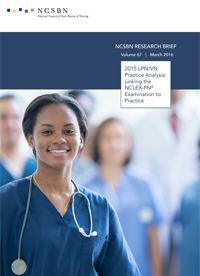
2015 LPN/VN Practice Analysis: Linking the NCLEX-PN Examination to Practice (Vol. 67)
This periodic performance of practice analyses (i.e., job analysis) studies assists NCSBN in evaluating the validity of the test plan that guides content distribution of the licensure examination. Because changes can occur in licensed practical/vocational nurse (LPN/VN) practice, practice analyses are conducted on a three-year cycle.
2016 | Exams Research
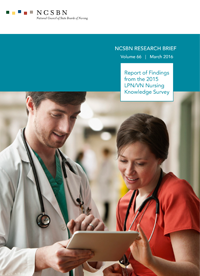
Report of Findings from the 2015 LPN/VN Nursing Knowledge Survey (Vol. 66)
This study identifies the knowledge needed by newly licensed practical/vocational nurses (LPN/VNs). The results of this study (i.e., the important knowledge statements) will be used to inform item development.
2016 | Exams Research
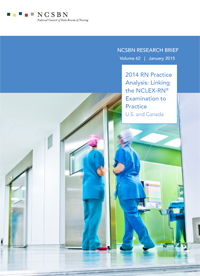
2014 RN Practice Analysis: Linking the NCLEX-RN Examination to Practice - U.S. and Canada (Vol. 62)
A practice analysis study aims to investigate the applicability of the 2013 NCLEX-RN Test Plan. This periodic performance of practice analyses (i.e., job analysis) studies assists NCSBN in evaluating the validity of the test plan that guides content distribution of the licensure examination. Because changes can occur in registered nurse (RN) practice, practice analyses are conducted on a three-year cycle. This publication analyzes both the U.S. and Canadian nurse testing populations.
2015 | Exams Research
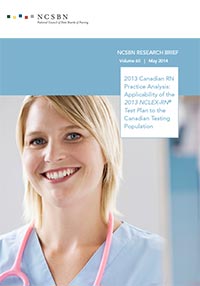
2013 Canadian RN Practice Analysis: Applicability of the 2013 NCLEX-RN Test Plan to the Canadian Testing Population (Vol. 60)
A practice analysis study aims to investigate the applicability of the 2013 NCLEX-RN Test Plan to the Canadian testing population. The study surveyed Canadian entry-level registered nurses (RNs) and found similar results with those obtained from U.S. entry-level RNs. It validates the applicability of the 2013 NCLEX-RN Test Plan to the Canadian testing population.
2014 | Exams Research
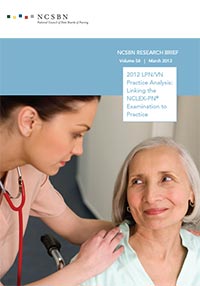
2012 LPN/VN Practice Analysis: Linking the NCLEX-PN Examination to Practice (Vol. 58)
This periodic performance of practice analyses (i.e., job analysis) studies assists NCSBN in evaluating the validity of the test plan that guides content distribution of the licensure examination. Because changes can occur in licensed practical/vocational nurse (LPN/VN) practice, practice analyses are conducted on a three-year cycle.
2013 | Exams Research
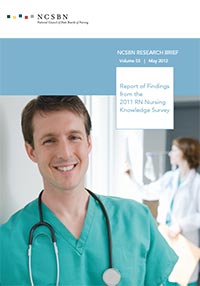
Report of Findings from the 2011 RN Nursing Knowledge Survey (Vol. 55)
This study identifies the knowledge needed by newly licensed RNs. The results of this study (i.e., the important knowledge statements) will be used to inform item development.
2012 | Exams Research
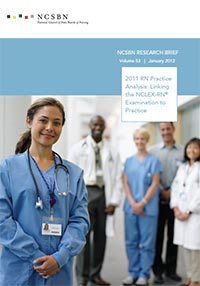
2011 RN Practice Analysis: Linking the NCLEX-RN Examination to Practice (Vol. 53)
This periodic performance of practice analyses (i.e., job analysis) studies assists NCSBN in evaluating the validity of the test plan that guides content distribution of the licensure examination. Because changes can occur in registered nurse (RN) practice, practice analyses are conducted on a three-year cycle.
2011 | Exams Research
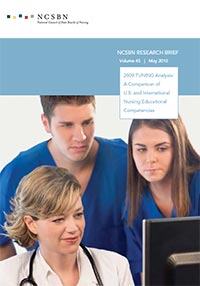
Report of Findings from the 2009 TUNING Analysis: A Comparison of U.S. and International Nursing Educational Competencies (Vol. 45)
A new initiative seeks to understand the role of nurses and nursing education from an international perspective. The goal of this study was to evaluate the consistency of nursing educational competencies globally. (© 2010)
2010 | Exams Research
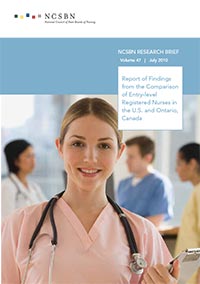
Report of Findings from the Comparison of Entry-level Registered Nurses in the U.S. and Ontario, Canada (Vol. 47)
This study compares entry-level nursing activities of U.S. registered nurses with a cohort from Ontario, Canada. The College of Nurses of Ontario (CNO) collaborated with NCSBN on this initiative. (© 2010)
2010 | Exams Research
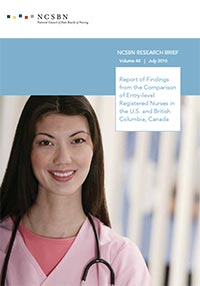
Report of Findings from the Comparison of Entry-level Registered Nurses in the U.S. and British Columbia, Canada (Vol. 48)
This study compares entry-level nursing activities of U.S. registered nurses with a cohort from British Columbia, Canada. The College of Registered Nurses of British Columbia (CRNBC) collaborated with NCSBN on this initiative. (© 2010)
2010 | Exams Research
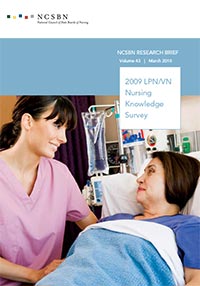
Report of Findings from the 2009 LPN/VN Nursing Knowledge Survey (Vol. 43)
This study is to identify the knowledge needed by newly-licensed LPN/VNs. The results of this study (i.e., the important knowledge statements) will be used to inform item development. (© 2010)
2010 | Exams Research
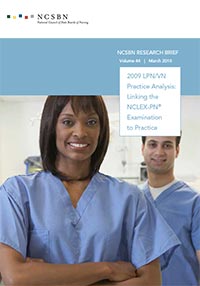
2009 LPN/VN Practice Analysis: Linking the NCLEX-PN Examination to Practice (Vol. 44)
This study describes LPN/VN practice to assist NCSBN in evaluating the validity of the test plan that guides content distribution of the licensure examination. (© 2010)
2010 | Exams Research
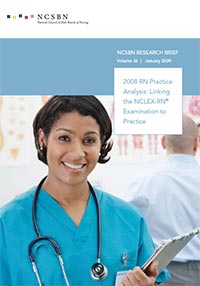
2008 RN Practice Analysis: Linking the NCLEX-RN Examination to Practice (Vol. 36)
This periodic performance of practice analyses (i.e., job analysis) studies assists NCSBN in evaluating the validity of the test plan that guides content distribution of the licensure examination. Because changes can occur in registered nurse (RN) practice, practice analyses are conducted on a three-year cycle. (© 2009)
2009 | Exams Research
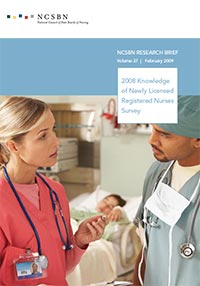
2008 Knowledge of Newly Licensed Registered Nurses Survey (Vol. 37)
This study is to identify the knowledge needed by newly licensed RNs. The results of this study (i.e., the important knowledge statements) will be used to inform item development. (© 2009)
2009 | Exams Research
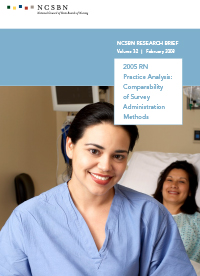
2005 RN Practice Analysis: Comparability of Survey Administration Methods (Vol. 32)
In order to improve the process of conducting practice analyses, NCSBN undertook this comparability study to investigate two different survey administration methods: the traditional paper-and-pencil, mail-based survey versus an electronic, Web-based survey. (© 2008)
2008 | Exams Research
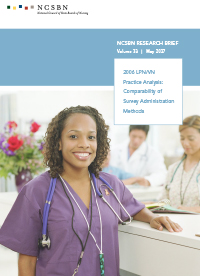
2006 LPN/VN Practice Analysis: Comparability of Survey Administration Methods (Vol. 33)
This study compares the effectiveness of two survey administration methods of researching LPN/VN practice to assist NCSBN in evaluating the validity of the test plan that guides content distribution of the licensure examination. (© 2008)
2008 | Exams Research
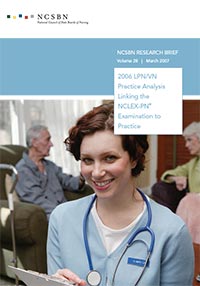
Report of Findings from the 2006 LPN/VN Practice Analysis Linking the NCLEX-PN to Practice (Vol. 28)
This study describes LPN/VN practice to assist NCSBN in evaluating the validity of the test plan that guides content distribution of the licensure examination.(© 2007)
2007 | Exams Research
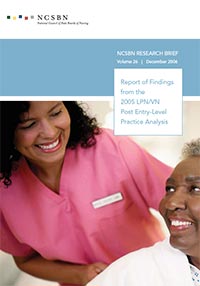
Report of Findings from the 2005 LPN/VN Post Entry-Level Practice Analysis (Vol. 26)
This study describes post entry-level LPN/VN practice with the intention of determining if there are core nursing activity statements for LPN/VNs regardless of practice setting, specialty practice area and/or years of experience (© 2007)
2007 | Exams Research
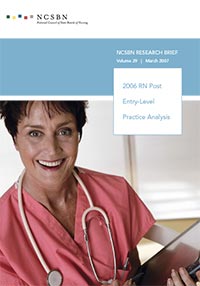
Report of Findings from the 2006 RN Post Entry-Level Practice Analysis (Vol. 29)
This study assists NCSBN in evaluating the validity of the NCLEX-RN examination. This study is the first to describe post entry-level RN practice to determine if there is a core set of RN activity statements that can be used to assess core RN competencies regardless of practice setting, specialty area and years of experience. (© 2007)
2007 | Exams Research
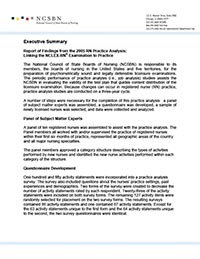
2005 RN Practice Analysis: NCSBN Executive Summary
NCSBN performs job (practice) analysis studies every three years. This is an executive summary of the 2005 RN Practice Analysis.
2005 | Exams Research
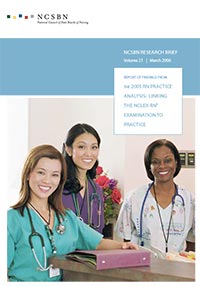
Report of Findings from the 2005 RN Practice Analysis (Vol. 21)
The purpose of this practice analysis is to describe and compare the practice characteristics and activities of newly licensed registered nurses (RNs). The empirical findings are used to evaluate the 2007 NCLEX-RN Test Plan (© 2005).
2005 | Exams Research
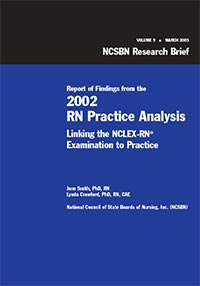
Report of Findings from the 2002 RN Practice Analysis Update (Vol. 9)
This practice analysis describes and compares the possible differences in the entry-level practices of newly licensed associate and baccalaureate degree nurses. (© 2004)
2003 | Exams Research
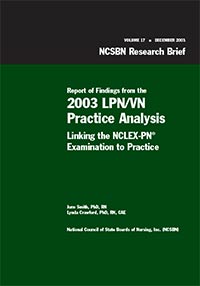
Report of Findings from the 2003 LPN/VN Practice Analysis: Linking the NCLEX-PN to Practice (Vol. 17)
This practice analysis describes and compares the practice characteristics and activities of newly licensed practical/vocational nurses (LPN/VNs). The empirical findings will be used to evaluate the 2005 NCLEX-PN Test Plan (© 2003).
2003 | Exams Research
